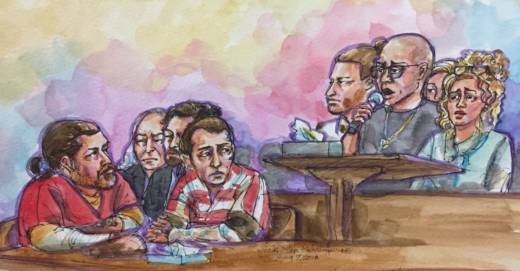Several family members of the dead said they would rather not share happy memories of their loved ones, wanting instead to preserve those stories for themselves.
"I want to keep all of those memories intact and crystalized for us, her family," said Sunny Haire, Cash Askew's stepfather.
Instead, he recounted how he rushed to the warehouse the night of the fire only to stand helpless outside and watch it burn. He said he found someone who had made it out and grabbed him by the shoulders, asking if he'd seen Askew get out of the building.
"I still don't believe any of this is real, even as I stand here today," Haire said. "She wanted to get home to the girl she'd recently fallen deeply in love with. She wanted to get home to call her family. All of that potential, all of that shimmering potential was snuffed out in that warehouse."
Linda Regan, Amanda Kershaw's mother, said she misses her daughter's phone calls — sometimes long conversations or just quick check-ins, but always with an uplifting voice on the other line.
"I loathe the day I will no longer remember that voice," she said, "which I know will come, thanks to you, Mr. Almena."
Other family members described recurring nightmares and crushing depression since the fire.
"Oftentimes, I start my mornings with a flashback to that day," Kershaw's brother Chris Allen said. "On the sentences and the plea deals, we feel betrayed."
Both prosecutors and defense attorneys in the case said they brokered the deal, with the help of Judge Morris Jacobson, to avoid putting family members through the trauma of a trial. But nearly every family member who spoke Thursday criticized the deal, and many expected the case to go to trial.
"I personally was looking forward to the trial," Michela Gregory's father David Gregory said. "This settlement is a slap on the wrist, a time out."
Gregory and others said they're still desperately seeking answers about the fire, answers they'd hope would come through a criminal trial. Many, including Gregory, said the building's owners, the city of Oakland, and Pacific Gas & Electric were "more culpable" than Almena and Harris.
Colleen Dolan, mother of Chelsea Dolan, called the plea deal a "convenient cover-up." To the thought that the families were spared a difficult trial, she said, "What bullshit."
"I used to be a nice person," Dolan began her statement. She showed a photo of her daughter taken before her death. She started to show another photo, and Cramer interrupted, asking if that was the photo taken of her daughter after the fire. Dolan said it was, and Cramer asked her not to show it.
"I've seen it," he said. "It does visually express the loss and terror your daughter suffered."
"I had to kiss that burned body goodbye," Dolan said, adding that she and her younger daughter stood outside the burning warehouse for hours, breathing "the same toxic smoke" that killed Chelsea.
"I am bereft and I am angry," she said.
Such a long series of victim statements is rare in a criminal case, and as people testified to their lasting loss and pain throughout the day, their grief began to visibly impact attorneys, reporters and anyone else in the courtroom.
Prosecutors read some statements from victims who didn't attend the hearing, including ones critical of the way they'd litigated the case.
"Oh how I wish I could plea bargain my grief to just a few years, rather than the rest of my life," Deputy District Attorney Autrey James said, reading a statement from Em Bohlka's mother Margaret Bohlka. His voice started to shake toward the end of the statement, when Bohlka wrote about her child's "dreams consumed by smoke and a bright future incinerated."
Almena and Harris are expected to give their own statements on Friday, and the court will also hear statements from their loved ones. If they are sentenced under the terms of the plea deal, Harris could be out of jail in fewer than two years. Almena could be free in under four years.
"I truly hope that when you do get out that the ghosts of the ship will haunt you until the last breath you take," David Gregory said.
